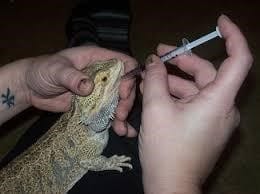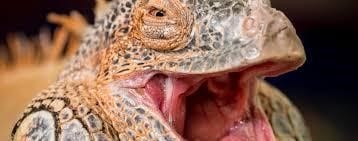A modest number of Pharmacokinetic studies have been conducted on a reptile, and Pharmacokinetic studies are quite limited when one considers all the drugs that are used to treat many of the species that almost 7500 of this extremely diverse class of animals. Medicines with available pharmacokinetic data should be selected when possible.
Reptiles and Drugs
It is not surprising to find variation in the effectiveness of certain drugs, of toxicities of other drugs when one attempts only just opinion from one to another species. It can be useful for some other drugs when no pharmacokinetic data are available, although there are limitations to metabolic scaling.
Remember that it should be noted that the reptilian resting metabolic rate is 1/10 to 1/3 lower the resting oxygen consumption rate of mammals of equivalent size.
It is important to correct hypothermia, malnourishment (hypoglycemia), and other suboptimal environmental conditions, dehydration, and electrolyte imbalance concurrent with the administration of therapeutic agents. This is especially important when you are about using hepatotoxic and nephrotoxic drugs.
Reptiles have a renal portal system as a unique component to the circulating system, like other lower vertebrates. It appears that the toxicosis was only attributed to high-dose of gentamicin rather than the route of administration, although reports exist of nephrotoxicosis that comes with the administration of aminoglycosides.
This has recent research has suggested that the parenteral administration of drugs into the caudal extremities may not be posted as great a risk as one thought. It still may prudent to avoid administering potentially nephrotoxic drugs into the tailor caudal extremities.
Antibiotics for Reptiles

Antimicrobial therapy is one of the important parts of medically managing reptiles that have infectious diseases. It is more difficult in the selection of specific chemotherapeutics than in mammals, because of the number of range of anatomic, behavioral, and physiologic peculiarities of the various species within the class of reptilia. The results should be correlated with the response of the treatment.
Here are the good-to-know facts about reptiles and antimicrobial therapy:
1. Considerations
Therapeutics can only be selected or modified based on the sensitivity and isolate data.
The two areas of the culture results must be evaluated. Other factors are considered when selecting an antimicrobial of the species being treated, frequency of administration, and the physical condition of the patient. The quantitative results and cost of the therapy, and owner compliance the minimum inhibitory concentrations.
2. Host
Most of the bacterial pathogens of reptiles and many of these could be part of the host’s normal flora. When the host is immunosuppressed or stressed are those becoming pathogenic. The presence of gram-negative bacteria or culture does not always indicate pathogenicity, and mixed infections are common.
3. Bacteria
Gram-negative bacteria that are most commonly isolated from reptile include; Aeromonas, organelle, klebsiella, pseudomonas, Providencia, and salmonella. And anaerobic infections are quite common, yet some of those are the most frequently used antibiotics in reptiles, aminoglycosides, and fluoroquinolones. These medicines are not effective against anaerobic bacteria. Antibiotics should not be used indiscriminately of the reptiles because of the risk of creating antimicrobial-resistant organisms.
Common Side Effects of Antibiotics
The common side effects associated with this antibiotic are inflammation, pain, and necrosis on the injection site. Those affected reptiles may withdraw the limb where an injection is given, attempt to escape, and experience skin discoloration or twitching at the site of injection.
Commonly Used Antibiotics for Reptiles
Almost the sick reptiles will not absorb drugs into their body properly. Some of the most commonly used antibiotics classes used in reptile medicine are fluoroquinolones, cephalosporins, and aminoglycosides. Antibiotics are often not very effective for reptiles when administered orally to them, and often the best way to administer them is by injection.
What will happen when your reptile pet medication does not bring their condition under control? It is not just one single problem or issue but various factors that contribute to the problem. The reptile veterinary will work to figure out why, and from there, they will create a new plan of attack. Finding the right and suitable combination of medications may require some trial and error.
Reasons Why Medicines Won’t Work to Reptiles
These are the few reasons why your reptile pet medication may not work. Here are as follows:
- Your reptile pet may not be taking medications correctly, or your reptile pet could be taking other drugs that interfere with your medications. Some of the reptile medications work best when taken at certain times of the day or with regards to the meals.
- Your reptile pet may be eating an improper diet. You may not know this, but certain foods can interact with your reptile medications. These foods can impact how your reptile pet body takes in medication or how the medications work to control your reptile pet condition. Parts of your reptile pet diet may also interact with your reptile pet condition to reduce the effect of your reptile medications.
- Your reptile pet could have other medical conditions that are affecting the way your reptile medications work. It is important to inform all of the reptile pet owners about other conditions your reptile pet may have to avoid these kinds of problems.
- Your reptile pet and the reptile veterinary could be making mistakes in testing. Make sure your results make sense and discuss with your reptile veterinary for them to double-check the testing and the results since this can affect how your reptile veterinary works.
- Your reptile pet may benefit from using a no medication treatment option in your plan if ever that your reptile pet condition is good enough. Some conditions, such as loneliness and simple body pain because they are always in the small cage, can improve with the help of other treatment options such a letting then out in the cage and have some exercise and feel them free out of the cage. Maybe your reptile pet does not have the right exercise. These other options can work together to restore the effectiveness of your reptile pet controls their condition. But if you also think that your reptile pet conditions are becoming worse, just go to the reptile veterinary to help their conditions.
Common Oral Pet medications for Reptiles

Enrofloxacin Oral Powder
These enrofloxacin drugs only prescribed for reptiles injection bacterial. The most common side effects that this antibiotic drug does to reptiles include inflammation, pain, and necrosis at the injection site. Loss of appetite, vomiting, diarrhea, lethargy, convulsion, seizures in pets with CNS disorders, cataracts if given long term.
Pyrantel Oral Suspension
This pyrantel drug is only prescribed for reptiles worms, infection cestodes, and infection parasitic. This medication is being used in treating intestinal worm infections, nausea, vomiting, diarrhea, stomach or abdominal cramps, headache, drowsiness, dizziness, trouble sleeping, or loss of appetite.
Allopurinol Oral Suspension
These allopurinol drugs only prescribed for reptiles uric acid reducer. These drugs have been effective in some cases, and some reptiles and are commonly not without side effects.
Pyrantel Oral Oil Suspension
This pyrantel drug is only prescribed for reptiles worms, infection cestodes, and infection cestodes, and infection parasitics. It is one hundred times more potent, and it is effects cannot be reversed.
Pentoxifylline Oral Suspension
This pentoxifylline drug is only prescribed for reptiles immune-mediated disease, intestinal amebiasis. Pentoxifylline drugs should not be used in animals that are sensitive to other xanthines such as theobromine, theophylline, or caffeine.
Never use these pentoxifylline drugs without your veterinarian’s perception. Serious side effects or death can occur in your reptiles if you use drugs on your pet without veterinarians’ advice.
Paromomycin Oral Oil Suspension
This paromomycin (Aminosidine) drug is only prescribed for reptiles infection bacterial and intestinal amebiasis. Paromomycin sulfate is an aminoglycoside which is high side effects include cramps, vomiting, nausea, diarrhea, rash, headache, and vertigo.
Praziquantel Oral Oil Suspension
This praziquantel drug only prescribed for reptiles worms and infection cestodes.
Voriconazole Oral Oil Suspension
This voriconazole drug is only prescribed for reptiles infection fungal. This is highly prevalent in reptiles and may result in severe disease and high mortality. Optimizing treatment is required because of the high incidence of therapeutic failures.
Praziquantel / Pyrantel Oral Suspension
It’s drugs only prescribed for reptiles worms, infection cestodes, and infection parasitic. Praziquantel/ Pyrantel drug side effects ate uncommonly but may include lack of appetite, diarrhea, and vomiting. Praziquantel / Pyrantel drugs are commonly used to treat in trematodes and cestodes in reptiles.
Calcium Glubionate
This Calcium glubionate drug is only prescribed for reptiles hypocalcemia. Calcium Gluconate is a mineral supplement, and adverse effects can be increased when calcium glubionate used.
Conclusion
Reptile medicines would help those suffering your reptile pet from any of these diseases and problems, but some of these reptiles medicine may affect your reptile pet health. Some of these reptile medicines cannot absorb into their body well. Most of these drugs have side effects on reptile pets.



